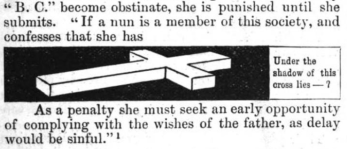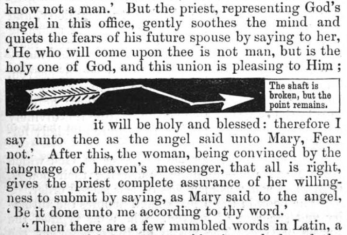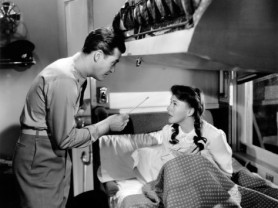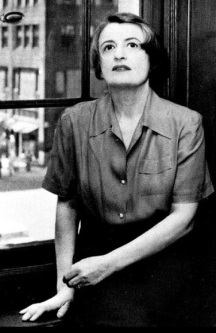I. I was talking to a friend about Stand by Me the other day, and she happened to mention (it made sense in context) that we don’t have more child molesters than we did in the past, we just catch them more often now and don’t cover it up as much any more. This statement got me thinking: I am initially inclined to agree with her, because I know that while the easiest way to change crime statistics is to redefine crimes, the second easiest way is to change reporting  methods, so I would tend to assume reporting lies at the bottom of any change. There are a couple of things that make me wonder, though.
methods, so I would tend to assume reporting lies at the bottom of any change. There are a couple of things that make me wonder, though.
II. The 1888 anti-Catholic hate book Why Priests Should Wed paints a portrait of priests as sexual predators…against adult women. It’s got nun-brothels straight out of gothic romance, and priests using the information they get in the confessional to blackmail or wheedle sex from their parishioners. But nowhere, in a book so filled with scandalous secrets and revelations that  it has to censor out large blocks of text with black bars or weird symbols (as depicted in these chaste excerpts), is there the suggestion that priests are after children.
it has to censor out large blocks of text with black bars or weird symbols (as depicted in these chaste excerpts), is there the suggestion that priests are after children.
(The “censored” blocks appear to be in every edition, and are certainly not an artifact of the digital book; they’re all over the hard copy, too.)
Why Priests Should Wed is hardly a book to be trusted, but it is a book that accuses the Catholic Church of rape, murder, torture, etc., so it’s strange that it should leave out crimes against children. (Actually, the Church is accused of murdering (p162) and brainwashing (p286 et passim) children, but you get what I mean. The shaft is broken, but the point remains.)
III. In Billy Wilder’s 1942 comedy film The Major and the Minor, Ginger Rogers plays a woman who disguises herself as a twelve-year old in order to get cheap train fare. Ray Milland, believing her to be a frightened child, takes her under his wing and puts her to bed in his sleeping car. When Milland’s suspicious fiancee (Rita Johnson) learns there’s a woman in Milland’s bed, she is furious. At that point this surreal dialog takes place (I’m paraphrasing).
When Milland’s suspicious fiancee (Rita Johnson) learns there’s a woman in Milland’s bed, she is furious. At that point this surreal dialog takes place (I’m paraphrasing).
She: You scumbag! You philanderer!
He: You don’t understand! She’s twelve years old!
She: Oh! My apologies for the unfounded suspicions.
That dialog might make sense nowadays if Milland had said “she’s my sister,” but it’s absurd as it stands. Of all the erotic possibilities romantic comedies  and Billy Wilder films can offer, it completely ignored this most taboo one.
and Billy Wilder films can offer, it completely ignored this most taboo one.
The Hayes Code or general decorum may have forbidden it, of course, but the movie still had to screen in theaters full of people who were not hooting in incredulity. Just as there was a time when Laurel and Hardy could sleep in the same bed and no one in the audience assumed they were gay, there was a time when a prepubescent Ginger Rogers could be in your bed and no one assumed you were a child molester.
IV. It’s very difficult to find out how common something no one will talk about is, and certainly people used to talk less, or not at all, about child molesters. It would be a mistake to assume that because it was not mentioned it didn’t happen; but it would also be a mistake to assume that because it happens now it must always have happened. I guess I, too, assume that it always happened, but I’m not sure the ratios have stayed constant.
(Obviously the idea of what counts as a child is culture-specific, as is the idea of what counts as forbidden; pederasty was socially acceptable in ancient Greece and twelve-year olds like Ginger Rogers used to marry (although perhaps further in the past than you might think).)
A year or so ago I saw a bus go by (I wish I had a picture of this) with an ad on the side, in big letters; “Sex with children is wrong,” it said. Most PSAs about child sexual abuse encourage recognition and reporting, but this one seemed targeted directly at potential child molesters themselves; and it made me worried. A linguist once told me that any time a rule starts getting floated by prescriptive grammarians, that is a rule that we are going to abandon: before people started confusing like and as, no grammarian harped upon it; it’s only recently that a grammar book would need to tell you to sometimes  say “me.” These are battles prescriptivists are losing! If you’re not losing you don’t need to make a big sign.
say “me.” These are battles prescriptivists are losing! If you’re not losing you don’t need to make a big sign.
One thing I have come to believe very strongly, and I know I’ve said this before, is that the only thing we learn is what’s normal. There were sporadic school shootings before Columbine, but the media focus on this one event taught people that shooting up schools was the done thing (before that it had been post offices), and our bizarre reactions to subsequent atrocities has only reinforced the idea, in a tragic spiral of normalizing what we’d all like to prevent. This is a hard theory to prove, of course, but it’s hardly a new way of looking at the world. Just ask Paul.
 According to Colin Wilson, cult leaders before the mid nineteenth century didn’t sexually exploit their parishioners; after that they always did. Joseph Smith is the watershed moment here—and I understand that Mormons have a different view of this, but the point is that the American press of the time framed Mormonism as a cult and framed its practices as sexual exploitation. They
According to Colin Wilson, cult leaders before the mid nineteenth century didn’t sexually exploit their parishioners; after that they always did. Joseph Smith is the watershed moment here—and I understand that Mormons have a different view of this, but the point is that the American press of the time framed Mormonism as a cult and framed its practices as sexual exploitation. They  made the practice normal. David Koresh, looking around for examples to emulate, was hardly going to take a wife and live chastely like Sabbatai Zevi.
made the practice normal. David Koresh, looking around for examples to emulate, was hardly going to take a wife and live chastely like Sabbatai Zevi.
V. No one makes a bus ad that reads “Don’t have sex with your siblings”; no one raises an eyebrow if close family members sleep over unsupervised. The incest taboo is still strong enough for us not to constantly worry about its being violated. There are many taboos of similar strength: you’ve probably never double checked at a barbecue that you weren’t being served human flesh. And yet a hypothetical Ray Milland of seventy years later is straight up going to jail. I’m not sure that kind of cultural shift means nothing.
I’d prefer not to normalize pedophilia; after all, no one likes child molesters; but I sometimes fear this is precisely what we’re doing. The abyss gazes also etc.
Maybe an alternate interpretation — it wasn’t so much a taboo before as something no one cared about.
Now, sure, people can certainly not care about things because they’re such an effectively internalized taboo that they need not care (or the possibility of it doesn’t even flit into their conscious thoughts). But there are plenty of other reasons, including the idea that it is, relatively, less harmful than other things that happen to children in life.
The analogy below is in poor taste, I apologize.
I don’t have the store of victorian (I don’t specifically mean victorian, i mean something like pre-post-modern and modern seems contemporary, and ppm seems gross) sensibilities that you have been able to construct with your broad reading — but my sense is that for quite a long while rape wasn’t considered so wrong because it was a violation of the autonomy (integrity, dignity, whatever word we want to use for why we think rape is wrong now) of the individual woman (though it was that, and that wasn’t great) but that it was a problem for the marriage and it’s harm to the woman was more in relation to her marriageability (or to the marriage itself if she’s already wed) than to her personhood/body/dignity. While we might care about those things today too — they certainly take a back seat (and I imagine that ‘we’ might ‘understandingly’ scorn a husband upset about his wife having been rape for reasons that have to do with his own relation to her — he didn’t suffer harm, she did).
The taboo we have against child molestation now is so deeply felt that I’m not sure we really understand what it is we hate about it. Is it that we want childhood to last forever, and we think of this as ending that? Is it that we have some data about the statistical outcomes, and we have a clear sense of the damage done to one’s life prospects? Is it that children are generally unable to fend for themselves and we hate the idea of asymmetrical harm? I don’t want to populate this list anymore, because I think (and I think I am agreeing with you here) that once you start putting reasons behind these things you’re not fighting the losing battle.
Whatever it is, though, I think something worth considering here is our shift in what we think about children and childhood. That shift may have put molestation on the map in a way that it wouldn’t have been before.
God I hope I don’t sound like a creep here.
LikeLiked by 1 person
You raise a lot of good points, and my apologies if I respond in a scattershot fashion.
Although our attitudes about rape have certainly changed, starting at least in the eighteenth century rape has been the proverbial “fate worse than death” for women. This probably had to do with a concept or womanhood as embodying purity, goodness, and holiness, principles of the “sentimental movement” — the idea that women needed to be protected from impure images or words, climaxing in Victorian prudery, is an offshoot of the same movement To the extent that women were therefore in part symbols, you could say that this differs from our ideas of autonomy, but it’s not like women’s virginities were merely being preserved for marriage contracts. (I can imagine that other people would differ from me on this, but I encourage reading the first chapter of Noel Perrin’s Dr. Bowdler’s Legacy.)
Childhood is clearly an invention of about the same time period, possibly a little later. Children’s books already exist by the late eighteenth century, but childhood as we know it is a Victorian invention. Until we have a Victorian idea of childhood I don’t think we could have child molesters, only statutory rapists; because I don’t think you can fetishize a category that doesn’t exist, and I assume that fetishizing the category is what child molesters are “into.”
Nevertheless, we still have a solid century and a half of the modern idea of childhood, and it I’d be interested in seeing how sexual abuse has changed during that time. I know Freud’s abandoned seduction theory implied that child sexual abuse may have been widespread in turn of the century Austria; but of course he (famously, controversially) abandoned this theory.
I do think the taboo against child molesting is irrational, but then I believe that all my beliefs are irrational, so it’s only par for the course. We obviously are obsessed, perhaps increasingly obsessed (or cult leaders are of course) with sex, so it may make sense to have our most passionately held taboos be sex specific.
But I argued once before that the reason we want to hate on and punish child molesters so spectacularly is because we believe we are safe from being hoist by that petard.
LikeLike